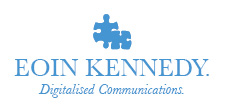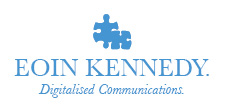Social Media Emphasis on ORM at Search Marketing World 2009
Social Media engagement seemed to be the big winner at Search Marketing World this year. The beauty and horror of these events is that you get to pick and choose the sections you can attend but invariably the ones you want to see clash. The three that I was particularly struck with were the Brand and Reputation Management, Social Media -Redefining the customer and The Ad Industry and Online Marketing. Too many learnings for this post so here I will deal with the Online Reputation Management one only.
Web Brand & Reputation Management
Brian Marin from Marin Software (not related believe it or not) began this session with an overview of the drop in levels of public trust from the Edelman Trust Barometer, where 83% of Irish people reported that they trusted brands less, before giving some examples of companies who have experienced bad karma online. The are some really strong examples of where the negative online activity can really impact on brands. Some of the ones he touched are worth reading and included:
TicketMaster is Evil and Must Die
Walmart Watch, which is a nationwide campaign to reval harmeful impact of Walmart
United Airline and customer compliants
Moben Kitchens – Destroys Your Health
Some of these are fully set up sites dedicated sites that have a damaging effect on the search engine traffic but the examples shown went beyond this to include facebook profiles that also mirrored above including
Starbucks Sucks (interestingly there are a number in this category)
The main point coming from this was that a lot of negative commentary is taking place and that most companies are blissfully unaware of it. Stage one being the obvious to establish resonable methodologies and automate the process of monitoring. Some good aids here are Brandwatch, BrandsEye and Yasni (for people searching). These can tell you a lot about trends but as Brian Marin pointed out you also need to watch downstream traffic using tools such as hitwise. He pointed to an example where HSBC were seeing lots of traffic to their site from Facebook (positive you would think) but when they tracked it back, it led to complaints by students about the bank.
All of this caught everyone interest but the pencils really started to scribble down notes when he covered actions you could take – some very ill advised – some reasonable. Most of the other sessions contained some element about the perils of trying to be more clever than the search engines so best to stick within the rules.
So what can you do if you are the recipient of negative online coverage especially when this pops up in search engine rankings before or after you company listing.
- Google Tattling. Basically looking for link buying by the site and telling Google in the hope they will take action against the site.
- Google Bowling. Not recommended but spamming the site with lots of links in the hope Google will act against them.
- Denial of Service. Again not recomended but overunning the site with so many requests that it become unaccessable.
- Creating land pages or microsites. Good in principle but the time and effort it takes to drive these up the search engine rankings (and out rank the negative commentary) makes it questionable about how useful they are.
- Insulation. Get some credited third party endorsement or positive coverage of your company or the story. Basically floating the good stories to the top.
All of these are fairly dramatic efforts but the real ways to protect your brand comes back to a lot of the basics in PR including:
- Participate in the discussion.
- Communicate positively – early ideally and point to actions taken to address the problem.
- Engage with the community. You will get a fairer hearing if you are part of the community.
- Treat the cause. Get to the fundamental root of the problem. Sounds obvious but many people still prefer to try cover up.
- Build trust and attract advocates. Nothing more powerful that other people coming to your rescue or balancing a debate rather than you defending the brand along. General Motors got a reasonable amount of flack in social media (as you would expect with some many cars and owners) but decided to let the debate continue. They were pleasantly suprised to see that members of the community came to their rescue with postive experiences.
These strategies are very positive news for the PR industry as the core skill set of communication is engrained in everything we do. Again the Edelman Barometer but a 91% figure was reported in response to being asked how important “communicates frequently and honestly on the state of its business” was to the overall reputation of a company.
Brians summary was also useful but in brief:
- Insulate search results
- Monitor your brand online
- Act fast and dont hide
- Communicate frequently and honestly
- Build trust and adovates
- And finally dont over do it. Make sure its natural.
Rob Shine from Cybercom had some additional gems to share.
The advent of Universal Search where other third party content is pulled high in search engine rankings, such as YouTube videos, is something people have seen but have not really thought about the implications. The Taco Bell video of rats running through the restaurant at night was followed by a huge online and traditional media coverage including footage of the reaturant opening up the next day. The Ryanair snoozing air hostess BBC coverage on YouTube also ranked high in Google. Interestingly enough the anti blogger stance by Ryanair, which for most would have been a near disaster, actually resulted in higher bookings to the site (higher visits to the site was expected). This sparked a debate about no PR being bad PR.
On the defenive tactic side Pay per Click advertising supported by good content can help to push down negative mentions or at least point to your side of the debate. One of the earlier presentations by Anthony Quigley pointed out that although many people ignore the ads on the side the paid for sponsored ads at the top of organic searches are frequently percieved as organic listings. This involves buying the negative keywords that people are using to find the story and then using google adwords to link to some positive aspect such as a balancing statement on the story.
Influecing the blogging community was another tactic mentioned but can take a long time and is uncontrollable.
Two other tactics were also covered including
1. Push down the critical site by having more positive pages rank above it. This covers optimised YouTube videos, optimised press releases, blog posts, social profiles etc and is well within the remit of PR companies.
2. De-legitimise the link in the eyes of the search engine.
You can always complain to Google through the editors of its Open Directory DMOZ. To be effective the critical site needs to be out of compliance with the DMOZ rules and can theorically decrease the importance of the site. However any action, if any, can be many months in actually taking place.
Rob finished up by highlighting the importance of establishing positive online PR as part of the marketing mix rather than waiting for negative commentary. He pointed to their work with blogger Guy Kawasaki who they brought over to the store house to show him how to pour the perfect pint. His subsequent blog posts on it resulted in 100,000 additional readers and an approximate 5% lift in visitors to the Guinness Store House site. He also spoke about an joint initiative with Irish photo sharing site Pix.ie. They realised the potential of tapping into the power of the thousands of amateur photos that are taken at the store everyday by creating a photo gallery on the site. In promoting this they did some blogger outreach where they targeted a group of influential photo bloggers and after a tour of the facility got 70 blog posts that helped generate an additional 400,000 extra readers of the site. Some of the photos that he showed were of an extremely high calibre and would have been difficult to achieve with a professionally contracted photo session.
Some of his summary tips were useful including:
- Importance of establishling a framework to identify issues and influencers
- Establishing proactive and reactive social media engagement teams
- Monitoring and moderation of key review and comparison sites over a period of time is critical to getting an initial feel of how the brand is percieved over time – rather than one post or thread.
The final speaker was Krishna De.
She open up with some more online reputation horror stories such as Motrin negative experience with a minor revolt in the blogosphere and social media sites over an ad they ran. Some users found the language and tone offensive (that interestingly was launched over a weekend) and resulted in a back peddling by the company.
She also pointed to an issue that blogger Emily Tully had with a mobile provider where the debate raged on IGO People. Interestingly the competing providers had a presence on the site and gained judos by interacting on the issue. It also made its way into main stream papers.
Krishna heavily endorsed using communications specialist to help decide the tone and nature of engagement when dealing with online reputation issues. One of the really obviously things that is overlooked by companies mentioned was the – Online Reputation Management Plan. We prepare these plans for clients for events in the real world but they are still very new for dealing with crisis and reputation issues in the online world especially with social media.
Krishna also pointed out the obvious step of making sure you own the url for high profile CEOs or management. She pointed to an example with Fast Company whose the CEO Shel Israel was parodied on a website in his own name following a volley of criticism over a inteview he did. This tactic also covers buying the domainname’sucks’.com address as this is a popular one for people who have an axe to grind with a company.
Another good practical measure, especially as brands are on the fence in relation to engaging with social media, was to at least claim ownership of the name. While not exactly cybersquatting there are many examples of multiple unofficial versions of sites/profile/brands on Facebook and Twitter. Apparently an Exxon Mobil Twitter account that was being lauded for being proactive was not officially part of the company.
In terms of engagement she also recommended getting in early rather than late and not necessarily staying until the bitter end.
Once again listening to the online conversation, understanding the medium and building relationship are key and should be done before a disaster strikes.
Overall some great learning and some new tricks. If PR people ever needed a reason to get to grips with adwords then this is a really strong one.



No comments